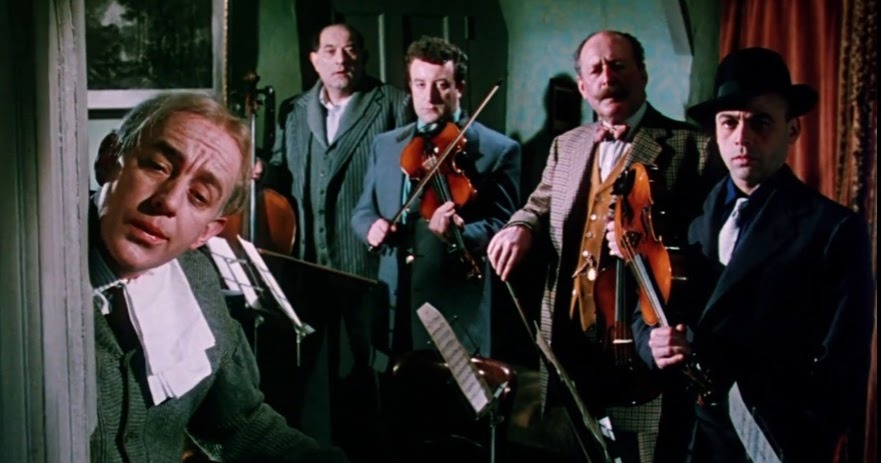Alec Guinness - Tumblr Posts

These are not the WIPs you’re looking for.
Nice try Obi-Wan. I’m not falling for those Jedi mind tricks.
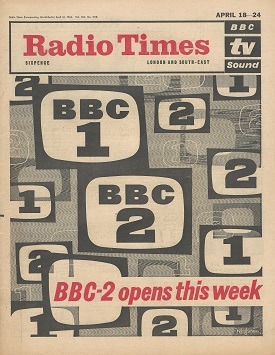
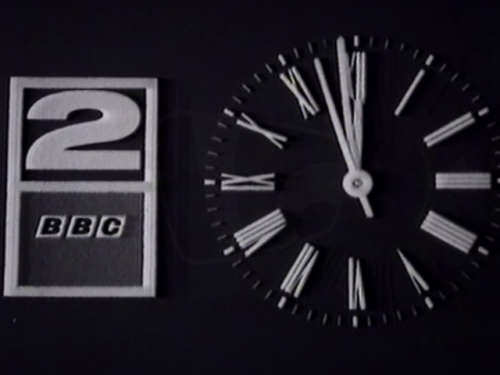

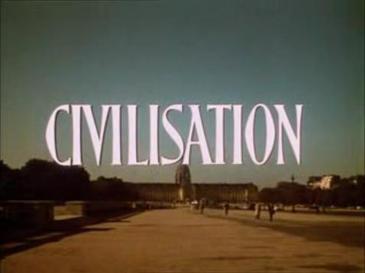






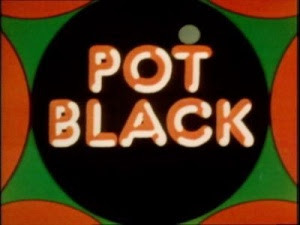



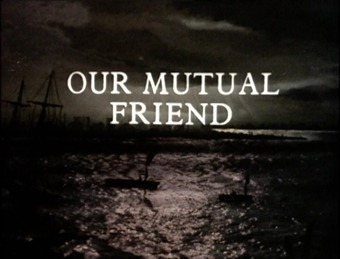





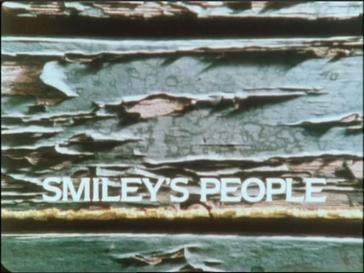


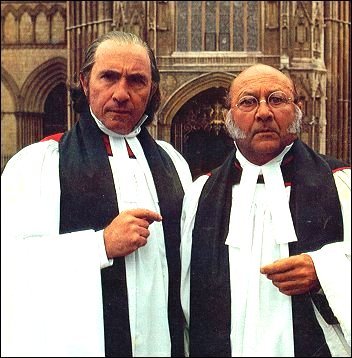






Happy 60th Birthday to BBC 2 or BBC TWO. Whichever.
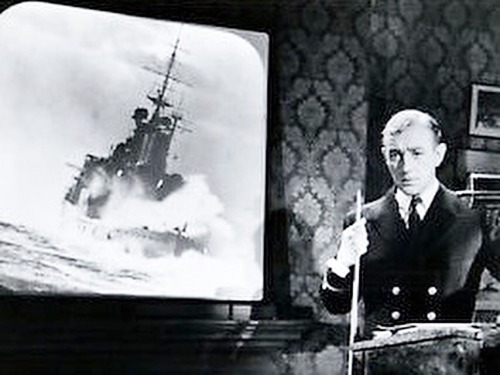
BARNACLE BILL aka ALL AT SEA (Dir: Charles Frend, 1957).
The last true Ealing comedy; 1958’s Davy, often regarded as the last, is a comedy/drama quite different in tone. Barnacle Bill, retitled All at Sea for US audiences, adheres to the ‘little guy against the system’ aesthetics of the classic Ealing comedy, although less subversively and with a little less bite than earlier films.
The marvellous Alec Guinness is on good form as Captain William Horacio Ambrose, the last in a succession of seafarers. Afflicted with seasickness, Capt Ambrose purchases a dilapidated seaside pier which he runs as a stationary luxury liner to the chagrin of the town council who wish to bulldoze the site to make way for a marina. A scene in which Guinness portrays his ancestors recalls Kind Hearts and Coronets (Robert Hamer, 1949) where he plays all 8 members of the D’Ascoyne family.
To be honest, Barnacle Bill is not as good as earlier Ealing comedies, despite its screenplay by TEB Clarke, scenarist of previous winners Passport to Pimlico (Henry Cornelius, 1949) and The Lavender Hill Mob (Charles Crichton, 1951). Perhaps director Charles Frend, an Ealing stalwart notable for Scott of the Antarctic (1948) and The Cruel Sea (1953) was better suited to drama than comedy. That said, it is not at all bad and as an example of a brand of comedy that cinema no longer produces it should be considered a minor treasure.
Check out my blog jinglebonesmovietime.blogspot.com for more reviews of vintage Ealing Studios classics!
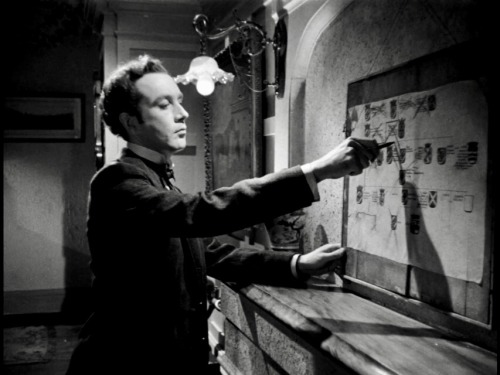
KIND HEARTS AND CORONETS (Dir: Robert Hamer, 1949).
1949 is the year that cemented the Ealing Studios’ close association with comedy. This year saw the release of three bona fide classics: Passport to Pimlico (Henry Cornelius), Whisky Galore (Alexander Mackendrick) and lastly Kind Hearts and Coronets.
Dennis Price stars as Louis Mazzini, only son of a disinherited heir to the aristocratic D’Ascoyn family, dispossessed for marrying an Italian singer deemed below her status. On his mother’s death he vows to take revenge on the family and sets out to murder the eight D’Ascoyns who stand between him and dukedom.
Price delivers a career best performance as Mazzini, cool and callous, yet charming enough to elicit audience sympathy, as he dispenses with the various D'Ascoyns. Excellent support comes in the form of Valerie Hobson and Joan Greenwood as rival love interests and an astonishing performance by Alec Guinness as the eight D'Ascoyns on Mazzini's hit list. The talented Robert Hamer directs with a light touch which never sees the movie descend into bad taste of farce.
The astute screenplay by Hamer and John Deighton, from a Roy Horniman novel, is both darkly cynical and witty and 70 years after release it remains, arguably, the blackest of black comedy scripts to reach British cinema screens.
In this respect it is unique among the Ealing comedies. Certainly it conveys the social commentary of its stable mates but lacking the gentle morals of say Passport to Pimlico or The Man in the White Suit (Alexander Mackendrick, 1951) and their reflection on post-war mores. Rather, its period setting allows for a biting critique of an outdated class system and the notion of inherited privilege.
While initially dismissed by some critics as too dark, Kind Hearts and Coronets is now widely considered the greatest of the Ealing comedies. It is difficult to think of any other movie so simultaneously dark yet delicate. Expertly performed and beautifully told; I would recommend this masterpiece of a movie to those with even the slightest interest in the cinema.
Visit my blog JINGLE BONES MOVIE TIME to read an unedited version of this review and reviews of other Ealing Studios classics! Link below.
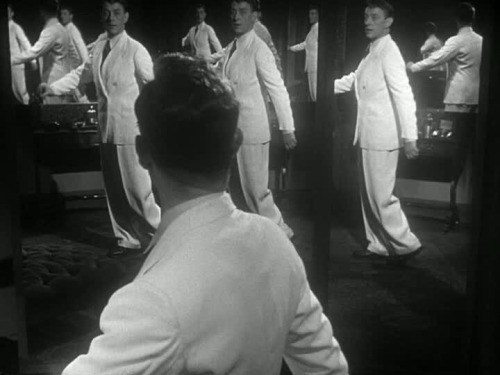
THE MAN IN THE WHITE SUIT (Dir: Alexander Mackendrick, 1951).
Ealing Studios were on fine form in 1951, producing two classic comedies. The Lavender Hill Mob (Charles Crichton) released in June, was followed two months later by possibly the greatest Ealing comedy of all, The Man in the White Suit.
Set in the textile mills of the north of England, The Man in the White Suit tells of Sidney Stratton (Alec Guinness), a research chemist who delivers a new wonder fabric. Indestructible and dirt repellent, the miracle fabric initially has Sidney lauded a genius. However, once the ramifications of such a product become clear, both mill owners and trade unions are keen to suppress Sidney and his invention.
In some repects, The Man in the White Suit in atypical of the Ealing Comedies. It shares with the others the broad theme of the individual vs the Establishment, but here seems to be taking a swipe at trade unions and the common man. In actuality its view of big business and commercialism is just as critical. Yet here, the 'little guy against the system' is a more ambiguous figure than usual. Although Sidney's noble ambition to clothe the world in indestructible fabric is a commendable one, ultimately the price of doing so would come at too great a cost. As his landlady remarks "What's to become of my bit of washing when there's no washing to do?" On the flipside of this is the wealthy mill owners whose greed sees them clamouring for Sidney's invention before attempting to suppress it, initially with bribes, then with more underhanded means. Business and labour eventually side with each other as poor Sidney is chased through the dark streets with his suit glowing luminous white! While the audience sympathy undoubtedly lies with Sidney, we are not too sorry at his inevitable downfall.
Thankfully, social commentary does not get in the way of this being a very funny film. The astute screenplay by John Dighton, Roger MacDougall and Alexander Mackendrick nicely balances the two opposing sides of industry with equal satirical bite. Mackendrick directs at brisk pace, creating a real feeling of suspense in the final moments.
Alec Guinness, arguably the greatest comic actor all time, is excellent here. His childlike optimism offsetting the cynical nature of the film. While Sidney’s blinkered belief in his invention is foolhardy, Guinness never portrays him as foolish, eliciting audience sympathy for a character who could have easily evoked derision. Reunited with Guinness is his Kind Hearts and Coronets (Robert Hamer, 1949) leading Joan Greenwood, equally effective here as his chaste love interest.
The Man in the White Suit walks a thin line between cynical satire and offbeat whimsy, but it does so with ease. I would argue it is the greatest of the Ealing comedies and an absolute comedy masterpiece. Highly recommended to anybody with the slightest semblance of a sense of humour.
Check out my blog JINGLE BONES MOVIE TIME for more reviews of classic Ealing Studios movies!
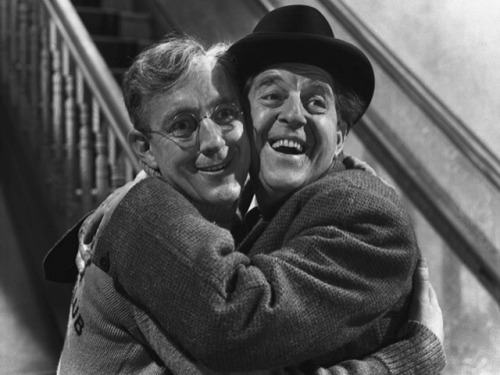
THE LAVENDER HILL MOB (Dir: Charles Crichton, 1951).
A classic comedy from the golden age of the Ealing Studios.
Mild mannered bank clerk 'Dutch Holland' (Alec Guinness) concocts a daring gold bullion robbery. Engaging the help of souvenir maker Al Pendlebury (Stanley Holloway) they execute the crime and disguise the gold in the form of miniature Eiffel Towers. However, things do not go to plan when a casement of the souvenirs is accidentally opened and sold to group of British schoolgirls.
Released the same year as The Man in the White Suit (Alexander Mackendrick), The Lavender Hill Mob is less satirical, but equally humorous as it gleefully sends up Ealing’s own popular crime dramas such as The Blue Lamp (Basil Dearden, 1951) and Pool of London (Basil Dearden, 1951). Director Charles Crichton effortlessly apes the quasi-documentary realist approach of those movies. The heist itself is as thrilling as it is humorous and makes excellent use of its real life London backstreets and warehouse locales. Crichton also manages to out Hitchcock Hitchcock with a vertigo inducing sequence which sees Guinness and Holloway make a dizzying descent down the steps of the Eiffel Tower. Significantly for a British film of the era, it was rewarded by the American Academy, winning the Best Original Screenplay Oscar for TEB Clarke’s excellent script.
As the criminal mastermind with the meek exterior, Guinness delivers another excellent performance; eliciting audience sympathy for a character which could have easily evoked apathy. Stanley Holloway is equally effective in the less showy role of co-conspirator. They make for a winning comedy team here, ably supported by Sidney James and Alfie Bass as fellow Mob members.
The Lavender Hill Mob made more impact internationally than any other Ealing film. Its theme of longing to escape from day to day drudgery is clearly a universal one. Like the best of the Ealing comedies it has hardly dated, despite its obvious post-War trappings.
Excelling in all areas: writing, directing and acting, The Lavender Hill Mob is another Ealing masterpiece.
Check out my blog JINGLE BONES MOVIE TIME for a longer, more in-depth review of The Lavender Hill Mob! Link below.

FATHER BROWN aka THE DETECTIVE (Dir: Robert Hamer, 1954).
The second big screen outing for G K Chesterton's fictional detective Father Brown, adapted from his 1910 short story The Blue Cross.
Roman Catholic priest and amateur detective Father Brown (Alec Guinness) pits his wits against elusive master criminal Flambeau (Peter Finch), intent on stealing a priceless cross from the clergyman.
Originally exhibited in the UK as Father Brown, the movie is now more widely available in prints bearing its US title The Detective. A glance at Father Brown’ s cast and crew and one would be forgiven for thinking this Columbia Pictures release was an Ealing Studios production. Director Hamer is reunited with his Kind Hearts and Coronets (1949) stars Alec Guinness and Joan Greenwood, whilst Ealing alumni Peter Finch, Bernard Lee, Sidney James and Cecil Parker all feature. However, any similarity between this lightly humorous detective story and an Ealing comedy ends here.
Languishing part way between comedy and mystery, the movie straddles both genres without a firm footing in either. Never reaching the witty heights of Kind Hearts and Coronets and not quite exciting enough to convince as a thriller. It ambles along nicely enough but lacks the narrative twists and turns that would have elevated the story above the mundane. Thelma Schnee and Hamer's screenplay never quite manages to over come the source material's inherent quaintness and at times threatens to become unbearably twee.
Alec Guinness is excellent as ever here, once again immersing himself chameleon like in the role of Brown. He is matched by the equally impressive Finch in a rare comedic performance for the actor, albeit not one especially played for big laughs. The rest of cast are, unfortunately, somewhat underused in what is largely a two-hander between Guinness and Finch.
Father Brown is good movie, but can't help but feel a little bit of a disappointment considering the talent involved. It is still worth a watch, if only for the excellent performances from its leading men. Not quite a classic, but a high quality time passer nonetheless.
Check out my blog JINGLE BONES MOVIE TIME for a longer review of Father Brown. Link below.
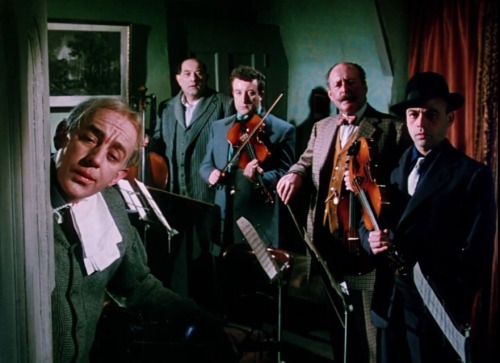
THE LADYKILLERS (Dir: Alexander Mackendrick, 1955).
Alec Guinness heads an ensemble cast in the last great Ealing comedy.
Seemingly mild mannered Professor Marcus (Guinness) leads a gang of oddball criminals, masquerading as classical musicians, in the planning and execution of a daring bank van raid. When their elderly landlady Mrs Wilberforce learns of the wrongdoings they all agree she must be silenced. However, Mrs Wilberforce is not as easy to do away with and their perfect crime begins to go awry.
Disguised with an oversized set of false teeth, Alec Guinness is excellent in his role as the cardigan wearing criminal. An outstanding ensemble cast makes up the rest of the gang. Cecil Parker as a corrupt retired army major, Herbert Lom as a Soho gangster, a subdued Peter Sellers as a cockney spiv and Danny Green as a dim-witted heavy; all give superlative performances. Upstaging them all, however, is the marvellous Katie Johnson as the seemingly frail Mrs Wilberforce who outsmarts the robbers.
One of a handful of Ealing productions shot in Technicolor, cinematographer Otto Heller's beautiful muted colour palette lends it an oddly surreal, atmosphere. This is complemented by Jim Morahan's excellent art direction; the wonderful tumbledown Victorian house in which much of the movie is set adding to the general off kilter ambience.
Director Alexander Mackendrick fashioned a deliriously dark comedy of the highest order; the only film blacker in the Ealing canon is Kind Hearts and Coronets. He elicits career best performances from his distinguished cast in what is among his greatest films.
William Rose's screenplay balances the light and dark with tightrope precision; neatly offsetting the contrasting worlds of ruthless criminals and twee little old ladies. Some broad farce involving an escaped parrot should sit uneasily with the otherwise subtle humour but, amazingly, the whole thing gels perfectly.
The Ladykillers is a masterpiece among comedy movies. Its mix of humour and thrills is irresistible and as an ambassador for the Ealing legacy it cannot be bettered.
Visit my blog JINGLE BONES MOVIE TIME for a longer, more in-depth review of The Ladykillers. Link below.
